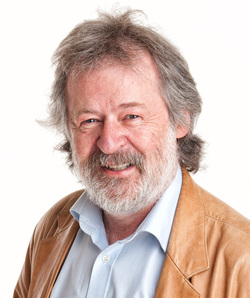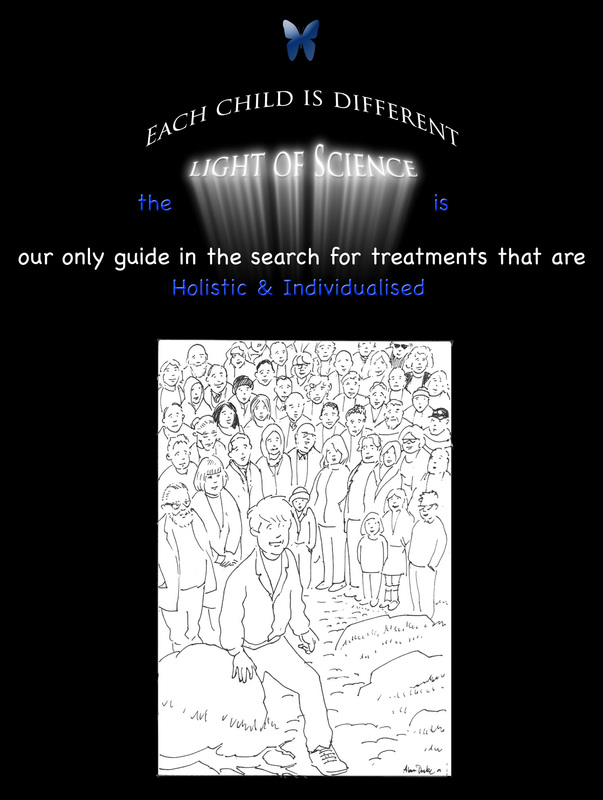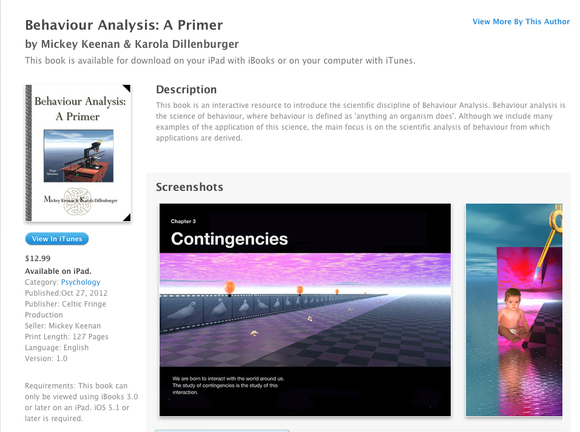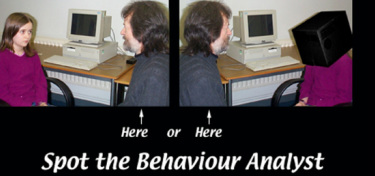California Judge Approves Sweeping New Rules on ABA
The California Department of Insurance has been given permission to institute emergency regulations preventing state-regulated health insurers from limiting visits or costs for ABA treatment for autism.
"Autistic children and their families should now, without delay, receive the transformative treatment that will enable them to succeed in school, their families, and communities," said Insurance Commissioner Dave Jones.
Jones said autism is a public health crisis and delays in approving Applied Behavior Analysis (ABA) treatment were making the crisis worse.
"Autistic children and their families should now, without delay, receive the transformative treatment that will enable them to succeed in school, their families, and communities," said Insurance Commissioner Dave Jones.
Jones said autism is a public health crisis and delays in approving Applied Behavior Analysis (ABA) treatment were making the crisis worse.
Prof. Mickey Keenan BCBA-D

School of Psychology,
University of Ulster,
N. Ireland
e'mail---- [email protected]
Board of Directors: Triangle Housing Association Ltd, which provides accommodation and a range of services to support people with complex needs. It is one of the largest providers of Supported Living services in Northern Ireland.
Board of Trustees: Cambridge Center for Behavioral Studies, www.behavior.org (USA).
Advisory Panel for Autism: Cambridge Center for Behavioral Studies (USA)
2014 Award for International Dissemination of Behavior Analysis
Society for Advancement of Behavior Analysis
2014 The Michael Hemmingway Behavior Analysis Award
Behavior Analyst Certification Board
2008 Award for Public Service in Behavior Analysis
Society for Advancement of Behavior Analysis
2006 Fellow of the British Psychological Society
2005 Personal Achievement Award:
New York State Association for Behavior Analysis
2002/3 Distinguished Community Fellowship
University of Ulster
2002 Award for Promoting Equality of Opportunity:
The British Psychological Society
2002 Making a Difference Award
British Broadcasting Co-operation (BBC)
2000 Fellow: Higher Education Academy
Books:
Nikopoulos, C.K., & Keenan, M. (2006). Video modelling and behaviour analysis; a guide for teaching social skills to children with autism. London: Jessica Kingsley Publishers
Keenan, M., Kerr, K.P., Henderson, M., & Dillenburger, K. (Eds.) (2006). Applied behaviour analysis and autism: Building a future together. London: Jessica Kingsley Publishers
Keenan, M., Kerr, K. P., & Dillenburger, K. (2000) (Eds). Parents' Education as Autism Therapists. London: Jessica Kingsley Publishers. (ISBN 1-85302-778-2)
Translation into Japanese (2005) JIHEISYO-JI NO OYA WO RYOIKUSYA NI SURU KYOIKU OUYOUKOUDOUBUNSEKIGAKU NIYORU EIKOKU NO JISSEN TO SEIKA (edited by N. Shimizu, Toyo University, Tokyo, S. Isawa, A. Kamei, K. Nishinaga, & N. Yamagashi. Publisher: Nihei-sha Co,Ltd, Sumiyoshi-ku, Osaka, 558-0023 JAPAN. ISBN: 4-86108-027-4 C3037
Translation into German (2012) Eltern als Therapeuten von Kindern mit Autismus-Spektrum-Störungen. Selbständigkeit fördern mit Applied Behaviour Analysis. Aus dem Englischen übersetzt und für Deutschland adaptiert von Hanns Rüdiger Prof. Dr. Röttgers
Multimedia Development
2011-2013 (see www.stamppp.com)
European Commission: Leonardo da Vinci; Transfer of Innovation; Science and the treatment of autism: A multimedia package for parents and professionals. STAMPPP II). (With QUB; University of Stockholm; State Diagnostic Centre, Iceland; Institute of Behavior, IULM University, Milan, Italy; PEAT; ANTAM)
2008-2010
European Commission: Leonardo da Vinci; Transfer of Innovation; Science and the treatment of autism: A multimedia package for parents and professionals. STAMPPP). (With University of Applied Sciences Muenster, Germany; University of Oviedo, Spain; Akershus University College, Norway; PEAT; Treehouse Trust/ANTAM, QUB)
University of Ulster,
N. Ireland
e'mail---- [email protected]
Board of Directors: Triangle Housing Association Ltd, which provides accommodation and a range of services to support people with complex needs. It is one of the largest providers of Supported Living services in Northern Ireland.
Board of Trustees: Cambridge Center for Behavioral Studies, www.behavior.org (USA).
Advisory Panel for Autism: Cambridge Center for Behavioral Studies (USA)
2014 Award for International Dissemination of Behavior Analysis
Society for Advancement of Behavior Analysis
2014 The Michael Hemmingway Behavior Analysis Award
Behavior Analyst Certification Board
2008 Award for Public Service in Behavior Analysis
Society for Advancement of Behavior Analysis
2006 Fellow of the British Psychological Society
2005 Personal Achievement Award:
New York State Association for Behavior Analysis
2002/3 Distinguished Community Fellowship
University of Ulster
2002 Award for Promoting Equality of Opportunity:
The British Psychological Society
2002 Making a Difference Award
British Broadcasting Co-operation (BBC)
2000 Fellow: Higher Education Academy
Books:
Nikopoulos, C.K., & Keenan, M. (2006). Video modelling and behaviour analysis; a guide for teaching social skills to children with autism. London: Jessica Kingsley Publishers
Keenan, M., Kerr, K.P., Henderson, M., & Dillenburger, K. (Eds.) (2006). Applied behaviour analysis and autism: Building a future together. London: Jessica Kingsley Publishers
Keenan, M., Kerr, K. P., & Dillenburger, K. (2000) (Eds). Parents' Education as Autism Therapists. London: Jessica Kingsley Publishers. (ISBN 1-85302-778-2)
Translation into Japanese (2005) JIHEISYO-JI NO OYA WO RYOIKUSYA NI SURU KYOIKU OUYOUKOUDOUBUNSEKIGAKU NIYORU EIKOKU NO JISSEN TO SEIKA (edited by N. Shimizu, Toyo University, Tokyo, S. Isawa, A. Kamei, K. Nishinaga, & N. Yamagashi. Publisher: Nihei-sha Co,Ltd, Sumiyoshi-ku, Osaka, 558-0023 JAPAN. ISBN: 4-86108-027-4 C3037
Translation into German (2012) Eltern als Therapeuten von Kindern mit Autismus-Spektrum-Störungen. Selbständigkeit fördern mit Applied Behaviour Analysis. Aus dem Englischen übersetzt und für Deutschland adaptiert von Hanns Rüdiger Prof. Dr. Röttgers
Multimedia Development
2011-2013 (see www.stamppp.com)
European Commission: Leonardo da Vinci; Transfer of Innovation; Science and the treatment of autism: A multimedia package for parents and professionals. STAMPPP II). (With QUB; University of Stockholm; State Diagnostic Centre, Iceland; Institute of Behavior, IULM University, Milan, Italy; PEAT; ANTAM)
2008-2010
European Commission: Leonardo da Vinci; Transfer of Innovation; Science and the treatment of autism: A multimedia package for parents and professionals. STAMPPP). (With University of Applied Sciences Muenster, Germany; University of Oviedo, Spain; Akershus University College, Norway; PEAT; Treehouse Trust/ANTAM, QUB)
Your browser does not support viewing this document. Click here to download the document.
Meeting the needs of families living with children diagnosed with autism spectrum disorder
Mickey Keenan, Karola Dillenburger, Alvin Doherty,
Tony Byrne, & Stephen Gallagher
2007
Funded by the Royal Irish Academy's Third Sector Research Programme
Foreword
As a parent of two children diagnosed with Autism Spectrum Disorder I have had my eyes opened over the last ten years with respect to the poor provision for children with disabilities in general. In particular, I have been dismayed by the lack of joined-up thinking between the powers that be in Health and Education and the sometimes non-existence of evidence-based-practice. One would think that in the year 2007, in a so-called developed country, we would have a priority to help our disadvantaged children. It may be that Northern Ireland has suffered from years of political unrest and the social and educational
needs of our children and families have been set to one side. However, today we still seem to be in the same mindset with continuing reviews, working groups and task groups presenting endless recommendations to the bookshelves. Most of these have been based on the opinions of professionals working in the field and one gets the impression that the consultations and reviews set out to show that what we already have is effective. However, ask any parent of a child with autism and they will tell you that the provision for their child and family falls far short of what they need. The politicians seem to be far removed from reality and more concerned with scoring political points than addressing real social need in our community. For far too long now the voice of the parents and carers, who live with the devastating effects of autism, has been ignored. For far too long the voice of the professionals, who work day to day with the families, has been ignored. High-level reports by public servants intrinsically present a conflict of interests. Are they going to conclude that what they have decided is ineffective? Terms like ‘best practice’ and ‘evidence-based’ are linked to reports that are nothing more than reviews of professional opinion and carefully selected publications that take no real account of outcomes.
The PEAT (Parents’ Education as Autism Therapists) Charity was established ten years ago with a mission to help children with autism achieve their full potential by providing training in ABA (Applied Behaviour Analysis) to parents and carers. Although PEAT has helped many families over the years, the statutory provision for families living with autism remains poor. The research presented in this report was required to identify and quantify the provision that families are actually receiving and what they think is required in the future. This research was needed to find out how the professionals working on the front line
actually view the situation. In fact, PEAT was established with hope that, if we endorsed science-based intervention for our children and evidenced the effectiveness, statutory providers would embrace this evidence-base and implement its practice and eventually there would be no more need for PEAT to exist. However, in many cases, this has actually led to disagreement between parents and professionals. Inaccuracies and acceptance of non-evidence based practice is in part responsible for this conflict and recourse to litigation only results in greater mistrust between the families and the statutory providers.
While this report may make uncomfortable reading for some, it is necessary to show those in positions of power that current services are neither adequate nor effective. The research has allowed PEAT to identify our priorities to help families and to develop a strategy for the next five years. Effective training for parents and carers can help to make a real difference for their kids but they need the full support of Health and Education professionals in their struggle with autism. Let’s work together to give the children their right to effective services and to give families their right to a good quality of life.
Tony Byrne
Chairperson PEAT
Executive summary
The research conducted for this report is underpinned by a scientific analysis that is holistic in its foundations, and which provides the basis for data-based decision making in relation to issues affecting the child and the family context. Autism Spectrum Disorder (ASD) is the clinical term for specific pervasive developmental disorders that have a substantial and functionally restrictive effect on the individual and their family, in particular with regard to social interaction and communication. In Northern Ireland (N.I.) and the Republic of Ireland (R.O.I.), an estimated 1 in 100 children are on the autism spectrum. In line with recommendations of the Mental Health and Learning Disability Review (Bamford & McClelland, 2006), a comprehensive needs assessment of parents of children on the autism spectrum, the children, and professionals working with these families was carried out in order to assess services currently provided, identify the needs of families, and to arrive at recommendations to ensure that a holistic perspective on future support and intervention is tailored to the needs of individual child, parent, and family systems. The project aimed to inform future strategic decision making of professionals, policy makers, and researchers. Comparative data were collected in Northern Ireland and the Republic of Ireland. In total, 95 parents representing 100 children with ASD and 67 multi-disciplinary professionals took part. A mixed-methods approach was used; detailed questionnaires supplied quantitative data and focus group discussions contributed qualitative data.
Results indicate a severe lack of statutory service provision, in particular in Northern Ireland; deficiencies in the actualisation of parent-professional partnerships; prolonged waiting times for diagnosis and ‘statementing’ processes; and absence of a coherent view on science-based policy and practice. While parents and professions largely agreed about future needs, there were some discrepancies with regard to the basis of interventions. The research uncovered considerable lack of knowledge and application of the science of behaviour analysis amongst professionals that can be directly linked to the non-inclusion of suitably qualified behaviour analysts in local governmental reviews and reports. This is in stark contrast with international practice (e.g., in USA, Canada, and New Zealand) where applications of behaviour analysis are recognized as the treatment of choice and behaviour analysts are involved in reports and reviews to ensure accuracy. Recommendations identify the application of a scientific approach that offers a common starting point for professionals and families with children on the autism spectrum.
Recommendations
Diagnosis
1. That the diagnostic process is shortened to a maximum of 90 days, in accord with international guidelines;
2. That internationally recognised measures and assessment tools are used (e.g., ADOS and ADI-R);
3. That all staff involved in diagnosis are trained to international standards in the use of validated and reliable diagnostic measures;
4. That one key worker/advocate be appointed to hold key responsibility for each family/child during and after the diagnostic process;
5. That modern technology be used (e.g., two-way mirrors, video recordings) to reduce the number of professionals to which a child is directly exposed;
6. That localised diagnosis and assessment is made available, in order to prevent unnecessary disruption and allow for a more rapid responsive mode of delivery;
7. That a comprehensive database of children with ASD and their families is established;
8. That the concept of ASD as a necessarily life-long disability be revised, in view of changes in behaviour resulting from intervention.
Early intervention and education
9. That SENS are issued speedily in line with the law (i.e., max 18 weeks);
10. That each child’s education and care plan is revised regularly, incorporating parental feedback and data derived from interventions;
11. That intervention begins early (i.e., immediately after diagnosis/before the child’s 3rd birthday) as recommended by international research and the All-Party Parliamentary Group on Autism (APPGA, 2003).
12. That localised intervention is made available to allow for a data-based, prompt, responsive mode of delivery;
13. That a long-term view is taken on the economic impact of intensive early intervention, i.e., that resource allocation decisions are based on national and international cost-benefit analysis;
14. That all children diagnosed with ASD are offered early intensive behavioural intervention for as long as necessary (in accord with international best practice);
15. That statutory bodies take up their responsibility to supply science-based early intervention, i.e., supply and support ABA-based home tuition programmes and day services;
16. That ABA-based schools and classrooms are developed and maintained by statutory education boards;
17. That all ABA-based intervention is supervised by a BCBA/PhD level trained behaviour analysts;
18. That all staff involved are trained to international standards in ASD and ABA.
Staff training
19. That accredited Masters level ABA training is fully supported by statutory education and further education bodies;
20. That a range of ASD and ABA training modules and Continuous Professional Development (CPD) courses are developed and supported;
21. That all CPD and short courses in ABA are taught by BCBA/PhD level trained behaviour analysts;
22. That teachers, teaching assistants, and MDT staff are appropriately trained in ASD and ABA;
23. That staff take into account the fact that modern day parents may be better informed than some of the staff on issues regarding ASD and ABA;
24. That ABA is considered for application in other areas of work (e.g., social work, community work, mental health, behavioural medicine) and that staff are educated about ABA in these areas;
25. That further research is carried out to keep abreast with international advances in science regarding ASD and ABA.
Parent-professional partnership
26. That parents’ input into the writing and review of care and education plans is comprehensively incorporated, and that data from professionally monitored home tuition programmes are included;
27. That parents are kept fully informed regarding financial, social, home, and respite care provisions, and early intervention;
28. That appropriate home, family, respite, and early intervention supports are available to parents and families;
29. That appropriate financial supports are made available to parents and families;
30. That individual and family needs of siblings and parents are considered in assessment and resource allocation;
31. That the extended family is fully involved in assessment and intervention, where appropriate;
32. That parent training courses are made available for ASD and ABA, taught by BCBA/PhD level trained behaviour analysts;
33. That parents are fully involved in decision making regarding assessment, review, and intervention;
34. That ABA is accurately presented in reports and review, i.e., that appropriately ABA-trained professionals are included on review boards or are fully consulted;
35. That professional competences and boundaries are respected and professional ethics are adhered to.
| ria_autism_report.pdf | |
| File Size: | 6028 kb |
| File Type: | |
The images in this site were created with the intention of stimulating the development of resources that go beyond what is possible with words alone.
You are free to use these images in your teaching but not for commercial purposes.
Mickey Keenan
University of Ulster
N. Ireland
[email protected]
www.simplestepsautism.com
STAMPPP
You are free to use these images in your teaching but not for commercial purposes.
Mickey Keenan
University of Ulster
N. Ireland
[email protected]
www.simplestepsautism.com
STAMPPP
| short_cv.pdf | |
| File Size: | 295 kb |
| File Type: | |
| autism-state_sponsored_child_abuse_.pdf | |
| File Size: | 1110 kb |
| File Type: | |




